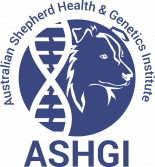Which genetic problems do I need to watch out for?
ASHGI’s 2010 health survey indicates that the breed has about two dozen inherited diseases and defects that occur often enough to be called common. They include, in approximate order of frequency: the MDR1 mutation, autoimmune diseases, allergies, hip dysplasia, missing teeth, umbilical hernia, cataract, hemangiosarcoma, epilepsy, retained testicles, elbow dysplasia, bad bites, distichiasis, generalized demodectic mange, excess white markings, natural bob-tail related defects, lymphoma, and laryngeal paralysis.
How do I avoid them if I’m looking for a companion or performance event dog?
Some of these are of little consequence if you want a pet. A bad bite, so long as it isn’t severe, or missing teeth will have little or no impact for a pet dog and in most cases won’t have any significant impact on performance ability. Problems related to bob-tails would be apparent at birth. The MDR1 mutation is only a problem if you give your dog certain drugs, so if both of its parents weren’t tested clear for it, you should test your dog so you know its status. Other things develop later in life or require screening tests. If you adopt a rescue or shelter dog have a vet check done. If you buy from a breeder, make sure the parents have had their health screening done.
How do I avoid them when looking for a breeding prospect?
Some, like bite faults, missing teeth, and retained testicles, are easy for you to evaluate simply by examining the dog you are interested, though these may not be apparent in young puppies. Also check as many of its near relatives as possible. Other issues require screening. Several more have no screening test and you can only estimate a particular animal’s risk through family history of the disease. By using the open health database and pedigree analysis service offered through ASHGI’s IDASH program you can determine whether your dog carries risk for various diseases and defects.
This website contains considerable information about health and other genetic issue in Aussies, as well as breeding advice. Use the search box in the upper right corner of this website to find articles pertinent to your specific concerns.
.
